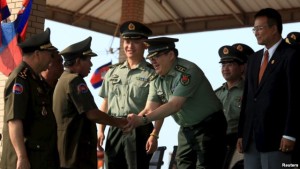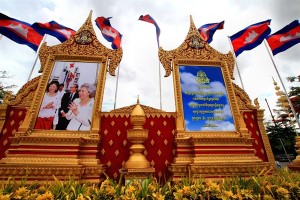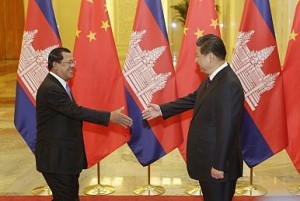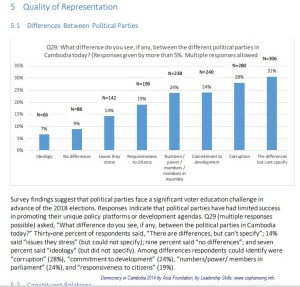Culture
now browsing by category
Analysts See Cambodia Bolstering Military Ties With China

FILE – Cambodian Defense Minister Tea Banh, second left, shakes hands with a Chinese army adviser during a graduation ceremony at the Army Institute in Kampong Speu province, March 12, 2015.
PHNOM PENH, CAMBODIA—Cambodia is strengthening its military ties with China, and analysts say it is likely to continue doing so for the forseeable future.
Cambodian Defense Minister Tea Banh made a five-day trip to China last week, meeting with high-ranking military officials and receiving pledges of assistance from the Chinese military.
In a recent interview, he told the VOA Khmer service that the visit was successful in bringing military cooperation between the countries even closer. That relationship is closer than Cambodia’s military ties with the U.S., he said.
Analysts say Phnom Penh is likely to look more and more to Beijing for support because of growing tensions with its old patron, Vietnam, over border issues.
Cambodia and China have traditionally enjoyed close relations, and they became noticeably closer after 2012 when Cambodia, as host of an Association of Southeast Asian Nations summit, sided with China over the contentious South China Sea issue.
The following year, Beijing provided Phnom Penh with a $195 million loan, which bought 12 Chinese Z-9 military helicopters. In May of this year, China pledged military trucks, spare parts, equipment and unspecified chemicals.
Cambodian Prime Minister Hun Sen has often touted the relationship. During the inauguration of a Chinese-funded road in Kampong Som province last month, he told a group of farmers that Cambodian-Chinese relations were at an all-time high, and that the two were moving toward a “comprehensive” partnership. China’s development fund for Cambodia for 2015 amounted to $140 million, up from $100 million the year before, he said.
Tea Banh defended the bilateral relationship, saying Chinese aid came with no strings attached and that China had never interfered in Cambodian affairs. He declined to disclose how much aid Cambodia would receive from his latest trip.
Benefits for China
Yet analysts warn that China is getting more out of the deal than Cambodia. Chheang Vannarith, a visiting professor at the University of Leeds in England, said China needs Cambodia as a partner in Southeast Asia, where competition is rising.
Cambodia’s Strategic China Alignment
Cambodia’s Strategic China Alignment
According to conventional wisdom, the international system leaves small states less room for maneuver. Cambodia is no exception. Since the kingdom won its independence from France in 1953, it had been preoccupied with protecting that independence, as well as its sovereignty and territorial integrity. During the Cold War, Cambodian foreign policymakers tried various approaches, from neutrality to alliances with major power(s) and, worst of all, isolationism. Yet Cambodia remained a victim of power politics, and ended up with a civil war and some of the worst atrocities of the 20th century.
Economically, China plays an increasingly important role in the socio-economic development of Cambodia as its primary trading partner, largest source of foreign direct investment, and top provider of development assistance and soft loans. Noticeably, two-way trade between Cambodia and China grew from $2.34 billion in 2012 to around $3.3 billion in 2013. Recently, the two countries agreed to boost their bilateral trade to reach the target of $5 billion by 2017. Similarly, Chinese investment in Cambodia in 2013 rose 65 percent, to $435.82 million compared to $263.59 million in 2012. More importantly, Chinese loans and grants to Cambodia reached $2.7 billion in 2012, making it one of the latter’s largest donors. Moreover, Cambodia will reap enormous benefits from new Chinese initiatives such as the Maritime Silk Road and the Asian Infrastructure Investment Bank.
In geopolitical and strategic terms, Cambodia had been a victim of its location as a country sandwiched between two powerful and historically antagonistic neighbors, Thailand and Vietnam. The history of Cambodia vividly suggests that over the six hundred years following the fall of the Khmer Empire, Thailand and later Vietnam regularly defeated Khmer armies and annexed Khmer territories. The two countries had always attempted to impose their suzerainty over Cambodia. Cambodia’s acceptance of the French protectorate in 1863 was an escape from suzerainty.
The eruption of a border conflict with Thailand from 2008 to 2011 reminded Cambodian leaders that its stronger neighbors remain a security threat to the kingdom’s territorial integrity. It also prompted Cambodian leaders to rethink the Association of Southeast Asian Nations’ (ASEAN) role in maintaining peace and stability in the region. In fact, since becoming a member of ASEAN in 1999, the regional grouping has always been the cornerstone of Cambodia’s foreign policy. Cambodian policymakers were convinced that ASEAN would be a crucial regional platform through which their country could safeguard its sovereignty and territorial integrity as well as promote its strategic and economic interests. However, it seems that Cambodia’s confidence in ASEAN has faded due to the grouping’s ineffective response to the Cambodia-Thailand border dispute.














